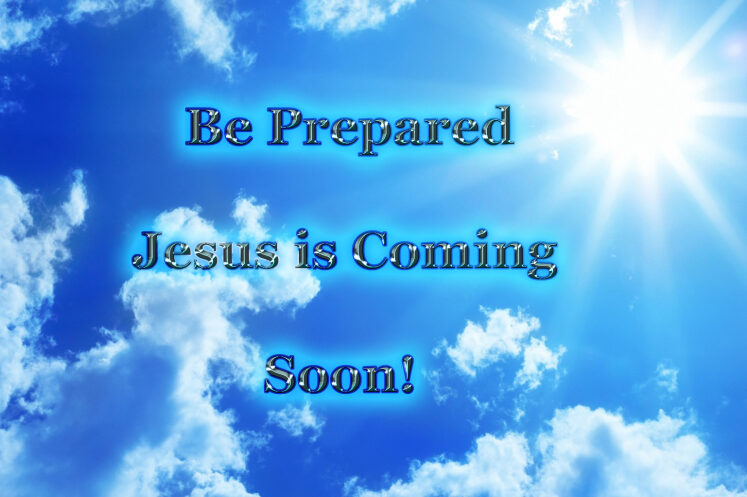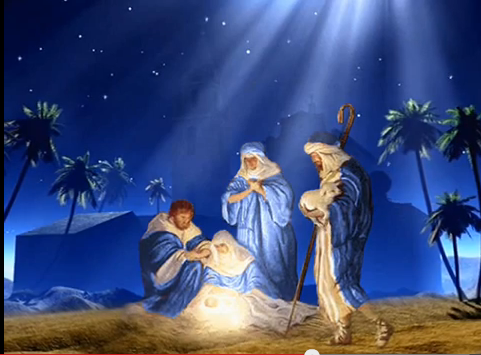That Event was the Birth of our Lord & Savior, Jesus Christ.
[ The Word Became Flesh ] In the beginning was the Word, and the Word was with God, and the Word was God. He was with God in the beginning. The Word became flesh and made his dwelling among us. We have seen his glory, the glory of the one and only Son, who came from the Father, full of grace and truth. John 1:1-2, 14 NIV
Matthew 1
New American Standard Bible (NASB)
The Genealogy of Jesus the Messiah
1 The record of the genealogy of Jesus the Messiah, the son of David, the son of Abraham:
2 Abraham was the father of Isaac, Isaac the father of Jacob, and Jacob the father of Judah and his brothers. 3 Judah was the father of Perez and Zerah by Tamar, Perez was the father of Hezron, and Hezron the father of Ram. 4 Ram was the father of Amminadab, Amminadab the father of Nahshon, and Nahshon the father of Salmon. 5 Salmon was the father of Boaz by Rahab, Boaz was the father of Obed by Ruth, and Obed the father of Jesse. 6 Jesse was the father of David the king.David was the father of Solomon by Bathsheba who had been the wife of Uriah. 7 Solomon was the father of Rehoboam, Rehoboam the father of Abijah, and Abijah the father of Asa. 8 Asa was the father of Jehoshaphat, Jehoshaphat the father of Joram, and Joram the father of Uzziah. 9 Uzziah was the father of Jotham, Jotham the father of Ahaz, and Ahaz the father of Hezekiah. 10 Hezekiah was the father of Manasseh, Manasseh the father of Amon, and Amon the father of Josiah. 11 Josiah became the father of Jeconiah and his brothers, at the time of the deportation to Babylon.12 After the deportation to Babylon: Jeconiah became the father of Shealtiel, and Shealtiel the father of Zerubbabel. 13 Zerubbabel was the father of Abihud, Abihud the father of Eliakim, and Eliakim the father of Azor. 14 Azor was the father of Zadok, Zadok the father of Achim, and Achim the father of Eliud. 15 Eliud was the father of Eleazar, Eleazar the father of Matthan, and Matthan the father of Jacob. 16 Jacob was the father of Joseph the husband of Mary, by whom Jesus was born, who is called the Messiah.17 So all the generations from Abraham to David are fourteen generations; from David to the deportation to Babylon, fourteen generations; and from the deportation to Babylon to the Messiah, fourteen generations.Conception and Birth of Jesus
18 Now the birth of Jesus Christ was as follows: when His mother Mary had been betrothed to Joseph, before they came together she was found to be with child by the Holy Spirit. 19 And Joseph her husband, being a righteous man and not wanting to disgrace her, planned to send her away secretly. 20 But when he had considered this, behold, an angel of the Lord appeared to him in a dream, saying, “Joseph, son of David, do not be afraid to take Mary as your wife; for the Child who has been conceived in her is of the Holy Spirit. 21 She will bear a Son; and you shall call His name Jesus, for He will save His people from their sins.” 22 Now all this took place to fulfill what was spoken by the Lord through the prophet: 23 “Behold, the virgin shall be with child and shall bear a Son, and they shall call His name Immanuel,” which translated means, “God with us.” 24 And Joseph awoke from his sleep and did as the angel of the Lord commanded him, and took Mary as his wife, 25 but kept her a virgin until she gave birth to a Son; and he called His name Jesus.The Visit of the Magi
2 Now after Jesus was born in Bethlehem of Judea in the days of Herod the king, magi from the east arrived in Jerusalem, saying, 2 “Where is He who has been born King of the Jews? For we saw His star in the east and have come to worship Him.” 3 When Herod the king heard this, he was troubled, and all Jerusalem with him. 4 Gathering together all the chief priests and scribes of the people, he inquired of them where the Messiah was to be born. 5 They said to him, “In Bethlehem of Judea; for this is what has been written by the prophet:
6 ‘And you, Bethlehem, land of Judah,
Are by no means least among the leaders of Judah;
For out of you shall come forth a Ruler
Who will shepherd My people Israel.’”
The Flight to Egypt
13 Now when they had gone, behold, an angel of the Lord *appeared to Joseph in a dream and said, “Get up! Take the Child and His mother and flee to Egypt, and remain there until I tell you; for Herod is going to search for the Child to destroy Him.”
14 So Joseph got up and took the Child and His mother while it was still night, and left for Egypt. 15 He remained there until the death of Herod. This was to fulfill what had been spoken by the Lord through the prophet: “Out of Egypt I called My Son.”
Herod Slaughters Babies
16 Then when Herod saw that he had been tricked by the magi, he became very enraged, and sent and slew all the male children who were in Bethlehem and all its vicinity, from two years old and under, according to the time which he had determined from the magi. 17 Then what had been spoken through Jeremiah the prophet was fulfilled:
18 “A voice was heard in Ramah,
Weeping and great mourning,
Rachel weeping for her children;
And she refused to be comforted,
Because they were no more.”
"Fair Use for Information & Educational Purposes"
http://www.biblegateway.com/passage/?search=Matthew+1&version=NASB
Celebrating Advent
Preparing for the Coming of Jesus Christ at Christmas
Celebrating Advent involves spending time in spiritual preparation for the coming of Jesus Christ at Christmas. In Western Christianity, the season of Advent begins on the fourth Sunday prior to Christmas Day, or the Sunday which falls closest to November 30, and lasts through Christmas Eve, or December 24.
What is Advent?

Image: Bernhard Lang / Getty ImagesAdvent is a period of spiritual preparation in which many Christians make themselves ready for the coming, or birth of the Lord,
Jesus Christ. Celebrating Advent typically involves a season of prayer, fasting and
repentance, followed by anticipation, hope and joy.
Many Christians celebrate Advent not only by thanking God for Christ's first coming to Earth as a baby, but also for his presence among us today through the
Holy Spirit, and in preparation and anticipation of his final coming at the end of time.
Definition of Advent
The word "advent" comes from the Latin "adventus" meaning "arrival" or "coming," particularly of something having great importance.The Time of Advent
For denominations that celebrate Advent, it marks the beginning of the church year.
In Western Christianity, Advent begins on the fourth Sunday prior to
Christmas Day, or the Sunday which falls closest to November 30, and lasts through Christmas Eve, or December 24. When Christmas Eve falls on a Sunday, it is the last, or fourth Sunday of Advent.
For
Eastern Orthodox churches which use the Julian calendar, Advent begins earlier, on November 15, and lasts 40 days rather than four weeks. Advent is also known as the
Nativity Fast in Orthodox Christianity.
What Denominations Celebrate Advent?
Advent is primarily observed in Christian churches that follow an ecclesiastical calendar of liturgical seasons to determine feasts, memorials, fasts and holy days:
•
Catholic •
Orthodox •
Anglican / Episcopalian •
Lutheran •
Methodist •
Presbyterian Today, however, more and more
Protestant and Evangelical Christians are recognizing the spiritual significance of Advent, and have begun to revive the spirit of the season through serious reflection, joyful expectation, and even through the observance of some of the traditional Advent customs.
Origins of Advent
According to the
Catholic Encyclopedia, Advent began sometime after the 4th century as a time of preparation for
Epiphany, and not in anticipation of Christmas. Epiphany celebrates the manifestation of Christ by remembering the visit of the
wise men and, in some traditions, the
Baptism of Jesus. At this time new Christians were
baptized and received into the faith, and so the early church instituted a 40-day period of fasting and repentance.
Later, in the 6th century, St. Gregory the Great was the first to associate this season of Advent with the coming of Christ. Originally it was not the coming of the Christ-child that was anticipated, but rather, the
Second Coming of Christ.
By the Middle Ages, the church had extended the celebration of Advent to include the coming of Christ through
his birth in Bethlehem, his future coming at the end of time, and his presence among us through the promised Holy Spirit. Modern-day Advent services include symbolic customs related to all three of these "advents" of Christ.
For more about the origins of Advent, see the
History of Christmas.
Advent Symbols and Customs
Many different variations and interpretations of Advent customs exist today, depending upon the denomination and the type of service being observed. The following symbols and customs provide a general overview only, and do not represent an exhaustive resource for all Christian traditions.
Some Christians choose to incorporate Advent activities into their family holiday traditions, even when their church does not formally recognize a season of Advent. They do this as a way of
keeping Christ at the center of their Christmas celebrations.





